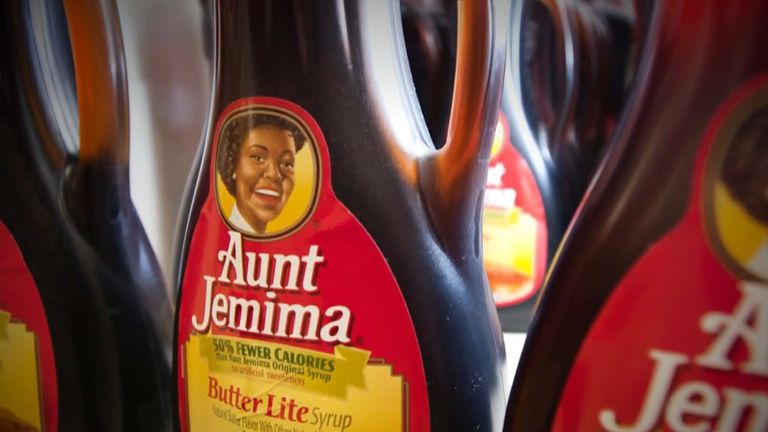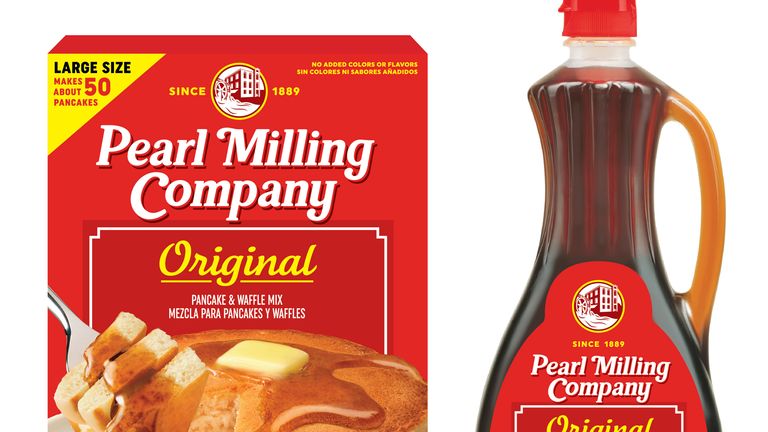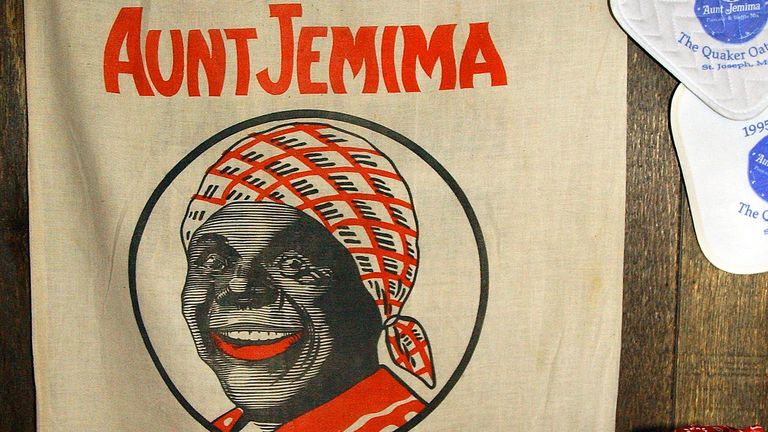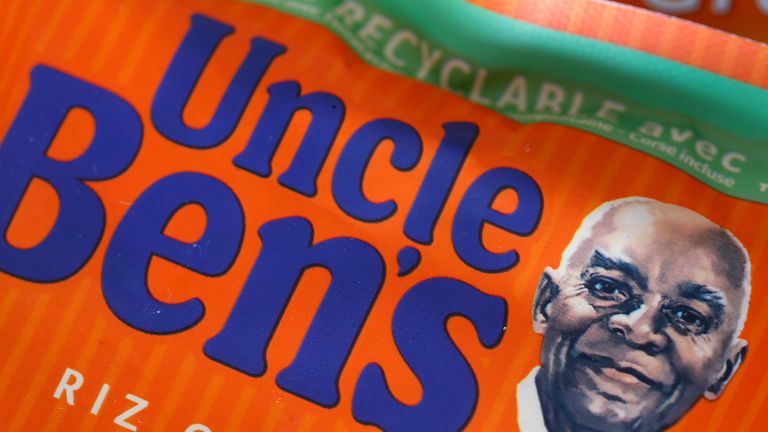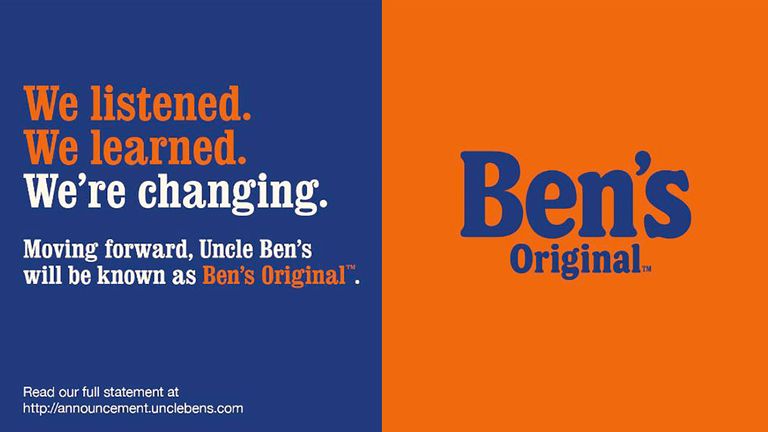'Aunt Jemima' brand officially retired over racial stereotype link
Pepsi, which owns the pancake mix brand via its Quaker Oats business, said the name and image "do not reflect our core values".
Wednesday 10 February 2021 19:11, UK
The killing of George Floyd last year and the subsequent Black Lives Matter protests sparked a good deal of anguish in corporate America.
Business leaders engaged in much soul-searching over whether they were doing as much as they could to reduce racial inequalities and, in many cases, put up meaningful sums of money to highlight their sincerity about tackling the problem.
For some businesses, though, the protests provoked soul-searching beyond whether they were doing enough to provide opportunities for their black colleagues.
They had to question whether the brands on which their businesses are built projected an appropriate image in this day and age.
Today saw the first tangible evidence of that process when the Quaker Oats Company, part of PepsiCo, officially retired its Aunt Jemima pancake mix.
The brand has been renamed Pearl Milling Co.
The Aunt Jemima name and logo will remain on supermarket shelves until June when the last of the old packaging goes.
A statement on the Aunt Jemima website said: "Last June, PepsiCo and the Quaker Oats Company made a commitment to change the name and image of Aunt Jemima, recognising that they do not reflect our core values.
"While the name on the box has changed, the great tasting products - the 'pearl' inside the familiar red box - remains the same, with a mission to create joyful breakfast moments for everyone."
The Aunt Jemima brand is 130 years old and the name was based on a character - a former slave - from a late 19th Century minstrel song in which white actors wore blackface make-up.
African-Americans had long complained about the 'Mammy' stereotype Aunt Jemima perpetuated, despite several makeovers of the character down the years, including taking away the headscarf she had previously worn.
Just hours after June's initial announcement from PepsiCo, which admitted that Aunt Jemima's origins "were based on a racial stereotype", the owner of another household name announced it too would be changing, as Mars promised it would be "evolving" Uncle Ben's, the world's biggest selling rice brand.
It had first been used in 1946 after Mars acquired an easy-to-cook rice brand called Converted Brand Rice.
The Uncle Ben's website, in an article on the heritage of the brand, explained: "Who is Uncle Ben? Actually, he was two people.
"The name comes from a black Texan farmer - known as Uncle Ben - who grew rice so well, people compared Converted Brand Rice to his standard of excellence.
"The proud and dignified gentleman on our boxes, who has come to personify the brand, was a beloved Chicago chef and waiter named Frank Brown."
However, for others, the brand carried sinister nostalgia for the slavery era.
The New York Times noted in 2007 - when Mars 'promoted' Uncle Ben to chairman of the company in a $20m advertising campaign - that it had previously been reluctant to make him centre-stage in the way, for example, KFC used Colonel Sanders in its advertising.
It wrote: "That reticence can be traced to the contentious history of Uncle Ben as the black face of a white company, wearing a bow tie evocative of servants and Pullman porters and bearing a title reflecting how white Southerners once used 'uncle' and 'aunt' as honorifics for older blacks because they refused to say 'Mr' and 'Mrs'."
Unlike Aunt Jemima, which has been replaced by the original name she herself supplanted in 1890, Mars is retaining a hint of the old moniker as the brand is being changed to Ben's Original.
It said: "We are not just changing our name and the image on the package, but also taking action to enhance inclusion and equity - and that comes with a new brand purpose to create opportunities that offer everyone a seat at the table."
The two brands are by far the best-known to be replaced in the wake of last year's events but are not the only ones.
Mrs Butterworth's, another popular US pancake and syrup brand famous for being packaged in a bottle shaped like a 'matronly' woman, has been put under review by its parent, Conagra, owner of the Duncan Hines cake mix and Slim Jim snack brands.
And another well-known brand in the US, Cream of Wheat semolina, is also reviewing its packaging.
This features a black chef, based on a well-known Chicago chef called Frank L White, who died in 1938.
He was preceded by another mascot called Rastus - the name of a popular minstrel character in the 19th Century but now a racial insult.
Not everyone has been satisfied by the changes and, intriguingly, they include some in communities the food companies had hoped to satisfy.
The retirement of Aunt Jemima in particular has caused unhappiness among relatives of some of the women to have portrayed the character over the years at events and in advertisements.
Lilian Richard, the third woman to do so, is commemorated in her home town of Hawkins, Texas, where her descendants host an annual pancake breakfast in which they celebrate her life.
Her great-niece, Vera Harris, told USA Today last year: "Not only is our family proud of her. The community [is] as a whole.
"We don't want her history to be wiped away. My aunt was a smart lady."
And Marcus Hayes, the great-great-great nephew of Nancy Green - a former slave who was the first Aunt Jemima - told the New York Times that she had used her fame to promote equality.
He added: "She would want the real story to be told of her and the ladies that came after. Aunt Jemima is more than just a character. She is Nancy Green."
One person who has remained silent on the matter, so far, is singer Gladys Knight, the Empress of Soul, who came under fire when, in 1994, she appeared in an advert for Aunt Jemima.
At the time, she said: "People used to joke about Aunt Jemima when I was a kid. But I felt she was a beautiful black woman.
"The image isn't so important to me. What matters to me is what's inside the box. I'm simply saying 'this is a good product'."
PepsiCo will doubtless be hoping consumers feel the same way about the new - old - brand of Pearl Milling.

